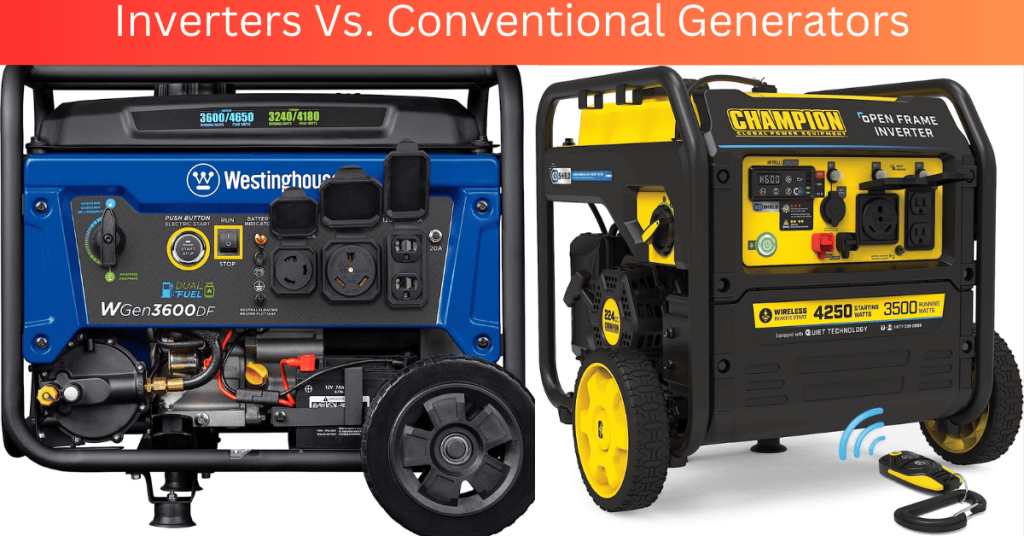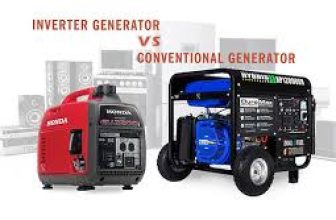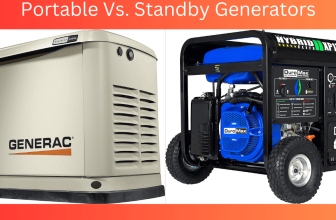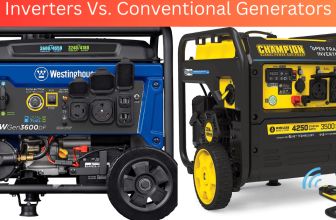Choosing your power source can be a daunting task. Whether you’re looking for an inverter or a conventional generator, it’s important to understand the pros and cons of each option so that you can make the right choice.
In this article, I’ll help you evaluate the differences between inverters and conventional generators so that you can choose the best power source for your needs.
If you’ve ever been in a situation where you needed electricity but didn’t have access to it, then you know how important it is to have a reliable and efficient power source. But with so many options on the market today, it can be difficult to know which one is best for you.
That’s why I’m here to help! In this article, I’ll explain the differences between inverters and conventional generators so that you can make an informed decision about your power source.

Definition Of An Inverter
I’m sure you’ve heard of inverters and conventional generators before, but what exactly are they? In this section, I’ll explain what an inverter is.
An inverter is an electrical device that takes the energy from a DC (direct current) source and converts it into AC (alternating current). This means that you can use it to power devices like laptops or phones that require AC electricity. Inverters come in a variety of shapes and sizes, so you can find one that fits your needs.
Inverters also have several advantages over conventional generators. For starters, they are smaller and lighter than conventional generators, making them easier to transport and store. Additionally, they are more efficient when it comes to fuel consumption, since they don’t need as much fuel to generate the same amount of electricity. Finally, they are generally quieter than conventional generators since they don’t require as much engine noise to run.
The benefits of using an inverter instead of a conventional generator make it a great choice for many people who need portable power solutions. And with such a wide range of sizes and features available on the market today, there’s sure to be one that meets your specific needs.
With all these factors in mind, let’s take a look at what a conventional generator is.
Definition Of A Conventional Generator
Well, let’s get started! A conventional generator is a device used to generate electricity in the absence of a power grid. It has been around for quite some time and is still widely used today.
This type of generator typically works by converting mechanical energy into electrical energy through an electrical generator. The most common form of mechanical energy used to generate electricity is combustion engines, such as those found in cars and trucks.
Conventional generators are relatively easy to operate and maintain, making them popular with many people who need portable power sources. They can be powered by either gasoline or diesel fuel and can produce enough electricity to power everything from small appliances to larger devices like air conditioners and refrigerators. Additionally, conventional generators are generally inexpensive compared to inverter models, making them more attractive for those on a tight budget.
The main disadvantage of using a conventional generator is its lack of efficiency when compared to an inverter model. Conventional generators rely on combustion engines which produce far less efficient output than an inverter model, resulting in higher fuel costs over time. Additionally, they require more maintenance due to the constant wear-and-tear on their parts caused by the frequent running of the engine.
From portability and cost effectiveness to fuel efficiency and maintenance requirements, there are several factors that come into play when deciding between an inverter or conventional generator as your primary power source. Let’s dive deeper into these pros and cons so you can make an informed decision about which option works best for you!
Inverter Vs. Conventional Generator: Advantages And Disadvantages
Now that we understand a bit more about conventional generators, let’s look at the advantages and disadvantages of inverter vs. conventional generators.
When it comes to inverters, they are typically quieter when running than conventional generators – this makes them great for camping trips or other outdoor activities where you don’t want to bother other people.
Inverters are also lighter in weight, making them easier to transport and store. On top of that, many inverters have a built-in USB port so you can charge your devices on the go!
But there are some drawbacks with inverter generators as well. They produce less power compared to conventional models, so if you need a lot of power for something like a job site or tailgating party then an inverter probably won’t do the trick. Additionally, they’re usually more expensive than their counterparts, so if you’re on a budget then a conventional generator might be your best bet.
These factors should help you decide which type of generator is right for your needs. But before making any decisions it’s important to consider the cost of each option too – we’ll explore this further in the next section.
Cost Considerations
When it comes to choosing a power source, cost is an important factor to consider. Both inverters and conventional generators have their own set of pros and cons in terms of cost.
Inverters are more expensive up front than conventional generators, but they have significantly lower operating costs due to their high efficiency and the fact that they can be powered by renewable sources like solar or wind. This makes them an attractive option for those who want to reduce their environmental impact and save money in the long run. Additionally, inverters are usually quieter and smaller than conventional generators, making them easier to store and transport.
Conventional generators may be cheaper than inverters initially, but they require more frequent maintenance and fuel refills which can add up over time. They are also typically louder than inverters, which could be an issue if you’re looking for something that won’t disturb your neighbours or environment. Furthermore, conventional generators don’t offer the same flexibility in terms of powering options as inverters do.
Taking all these points into account, it’s important to weigh your options carefully when making a decision on what power source is best for you.
Next we’ll look at another important factor: fuel type.
Fuel Type
When it comes to powering your home, two of the most popular methods are inverters and conventional generators. It’s important to consider the differences between the two in order to determine which one is best for you.
To begin with, fuel type is an important factor. Inverters tend to use gasoline, natural gas or diesel whereas conventional generators typically use only gasoline. This can be a deciding factor for many people because if they don’t want to store or buy large containers of fuel, then inverters can be great options since they use smaller tanks.
| Inverter | Conventional Generator |
|---|---|
| Gasoline | Gasoline |
| Natural Gas | |
| Diesel |
The portability of each option should also be taken into consideration when making a decision. Inverters are generally more portable than conventional generators due to their lighter weight and smaller size. This makes them great for those who need something that can be moved around easily or used in different locations.
No matter which option you choose, both come with advantages and disadvantages that need to be weighed carefully before investing in either one. With this knowledge in hand, you will now have a better understanding of each type so you can make an informed decision about what’s best for your needs. Taking into account all these factors will help ensure that you end up with a power source that suits your lifestyle perfectly.
Portability
When it comes to portability, inverters are the clear winners. They’re lightweight, compact, and can be easily moved around from place to place if needed. I can just toss my inverter in the trunk of my car and take it with me wherever I need it. It’s perfect for those times when I’m camping or RVing, or just need some extra power at the beach.
On the other hand, conventional generators are bulky and heavy. It would require a good deal of effort to move one around, so they’re best suited for fixed locations that don’t require much mobility.
Inverters also come with a range of features that make them even more portable. For example, some inverters come with wheels which makes them easy to transport over rough terrain or up stairs. Other models have handles built-in for carrying them from one location to another without having to lift them up – this is especially useful for those who have back problems or strength limitations.
Many inverters also come with an optional remote control so you can operate it from a distance – something that isn’t possible with conventional generators.
So if you’re looking for something mobile and easy to transport on a regular basis, then an inverter is definitely your best option. Moreover, their lightweight construction means they won’t take up too much space in your car or RV either! That said, if you plan on keeping your power source in one location most of the time then you may want to look into conventional generators instead – but more on that in the next section… Noise level.
Noise Level
When it comes to choosing your power source, one of the most important things to consider is noise level. Are you looking for a quiet generator that won’t bother your neighbors or disrupt your outdoor activities? Well, you’re in luck – there are several options available on the market today!
Inverters are generally the more quiet option, as they produce much lower decibel levels than conventional generators. Inverters also run steadily at a lower RPM, which helps keep noise levels down. By comparison, conventional generators often operate at higher RPMs and generate more noise from their engines.
So if you’re looking for a quieter option, an inverter generator is probably the way to go.
Moving on from here, let’s take a look at how easy each type of generator is to maintain…
Maintenance
Well, now that we’ve discussed the different types of power sources available to us, let’s move onto something equally as important – maintenance.
Taking care of your device is key to keeping it running in optimal condition for a long time.
Whether you opt for an inverter or conventional generator, there are certain steps you should take to ensure that everything is working properly and efficiently.
Checking the fuel levels and oil levels regularly is essential for both types of generators; however, inverters may require additional steps such as checking battery levels or testing the output voltage.
Inverter generators also need their filters cleaned regularly and their moveable parts checked to make sure they are not loose or damaged in any way.
On the other hand, conventional generators need more frequent oil changes and filter replacements than inverters do.
It’s also important to check your spark plugs regularly and keep a watchful eye on the recoil starter rope to make sure it isn’t frayed or tangled up.
With proper maintenance and care, both types of generators can continue to provide reliable power sources for many years.
Now that we know how to maintain our power sources, let’s turn our attention towards safety when using them.
Safety
When it comes to power sources, safety is a major factor. Both inverters and conventional generators have their own benefits in this regard, but there are also drawbacks to consider. To make the right decision for your needs, let’s take a look at each option.
Inverters are becoming increasingly popular because they come with enhanced safety features, such as low voltage shutoff protection and spark-free operation. They are also more efficient than conventional generators and quieter to operate.
| Pros | Cons |
|---|---|
| Enhanced safety features | Expensive |
| Efficient | Require additional maintenance |
| Quieter operation | Limited power output |
Conventional generators offer more power than inverters and can be used for larger applications. But they can produce harmful emissions and require regular maintenance to keep them running smoothly. Furthermore, they generate higher levels of noise pollution than inverters, which may not be ideal for residential areas.
As you can see from the table above, both options come with advantages and disadvantages when it comes to safety. So before making your final decision, weigh up the pros and cons carefully so that you can make an informed choice that fits your needs best.
Considering environmental impact is another important factor when choosing your power source – but that’s a topic for another discussion entirely…
Environmental Impact
When it comes to choosing a reliable power source, inverters and conventional generators have their own advantages. But when it comes to environmental impact, there’s no comparison.
Inverters are far more eco-friendly than traditional generators, producing less noise pollution and carbon dioxide emissions. Inverters are powered by batteries that are charged by solar panels or other renewable energy sources. This means they don’t emit any harmful gases or pollutants into the environment. Additionally, since inverters don’t require fuel to run, they can be used in remote locations where access to fuel is limited or non-existent.
Conventional generators on the other hand rely on gasoline or diesel fuel which produces toxic fumes and releases large amounts of carbon dioxide into the atmosphere. The loud noise generated by these machines also contributes to noise pollution and can disrupt wildlife habitats and human settlements near the generator’s location.
Unlike conventional generators, inverters provide an environmentally friendly way to keep your home powered up with clean energy that won’t harm the environment. They’re also incredibly efficient and require minimal maintenance, so you can feel good about your decision for years to come!
Frequently Asked Questions
What Is The Maximum Wattage An Inverter Can Supply?
So you’re wondering what the maximum wattage an inverter can supply?
Well, it really depends on the size of the inverter.
Generally, smaller inverters offer between 500 and 3,000 watts of power, while larger models can provide up to 10,000 watts or more.
It’s important to choose an inverter that is powerful enough to meet your needs for electricity.
That way, you won’t have any issues with running out of power when you need it most!
How Often Should A Conventional Generator Be Serviced?
Servicing your conventional generator is essential for keeping it running efficiently and safely. It should be done at least once a year, but ideally twice a year in the spring and fall.
Doing so will help you avoid costly repairs and ensure that it’s always ready to supply power when you need it. You should also check the oil levels and other fluids before each use, as well as make sure all the connections are secure.
Taking care of your generator will save you time, money, and headaches in the long run.
What Type Of Safety Features Are Included In Inverters?
Inverters come with a range of safety features that make them a great option for your power source.
They feature short-circuit protection, overload protection, overheat protection, and low voltage alarm. All these features help prevent damage and keep you safe from potential electrical problems.
Plus, inverters come with an automatic shut-off when the battery level reaches its lowest limit, so you don’t have to worry about depleting your power source without noticing it.
What Is The Expected Lifespan Of An Inverter?
Inverters can last for years; some of the best models come with warranties of up to five years.
Generally, you can expect an inverter to last anywhere from three to ten years depending on how often it’s used and how well it’s maintained.
Make sure you keep your inverter clean, dry and away from direct sunlight, as this will help protect it from damage and extend its lifespan.
What Is The Noise Level Of An Inverter Compared To A Conventional Generator?
If you’re looking for an efficient, quiet power source, then an inverter is the way to go.
Inverters are known for being quieter than conventional generators, producing only about 50 decibels compared to 65-80 decibels from a conventional generator.
That’s a huge difference – you’ll barely be able to hear your inverter running!
Conclusion
Inverters and conventional generators both have their advantages and disadvantages. Ultimately, the decision comes down to personal preference.
If you want something that is reliable yet more expensive, a conventional generator might be the best option. On the other hand, if you are looking for something efficient and quieter, an inverter may be your best choice.
It’s important to consider all the factors before making a decision such as wattage, noise level, lifespan and safety features. By taking into consideration all these aspects, you can make an informed decision on which power source is right for you.





